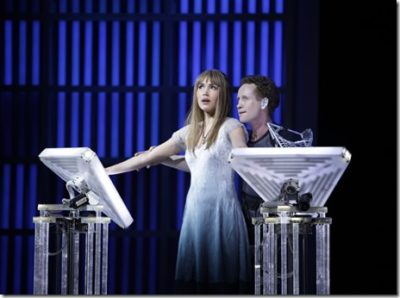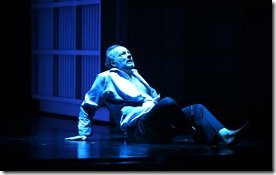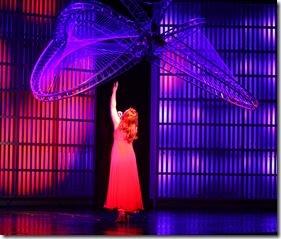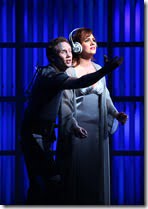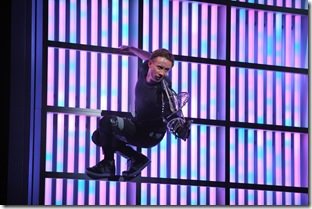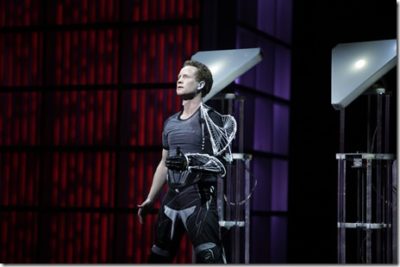Death and the Powers
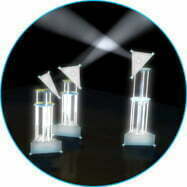
Composed by Tod Machover
Libretto by Robert Pinsky
Story by Robert Pinsky and Randy Weiner
Directed by Diane Paulus
Produced by Chicago Opera Theater
At the Harris Theater
Now my charms are all o’erthrown, And what strength I have’s mine own, Which is most faint.
– William Shakespeare
Explaining death to the deathless is a daunting task, indeed. That is the aim of this opera within an opera: robots acting out a story about death, at their creator’s behest, attempting to discover what, exactly, it is. That, in a rude nutshell, is Death and the Powers. And yet to spell it out like that – much like spelling death out in a cut and dry fashion – misses something of the point.
Because this opera struggles with death, with its meaning, with its substance. The head of the family, Simon Power (James Maddalena), is a billionaire genius who has created a computer system for him to inhabit once his dying body finally gives out. Although incorporeal, he can still speak, interact, and, in a sense, live. It’s sort of Neuromancer-meets-Zhuangzi. When he goes into the System, he assures himself he will not change, tries to force himself to remember who he is, what made him, him. His wife and daughter, Evvy and Miranda (Emily Albrink and Sara Heaton – and there is no mistaking the reasons for selecting the name Miranda), are worried he is gone; but Nicholas (Hal Cazalet), a cyborg whom Simon plucked out of a children’s home and gave limbs where limbs were lacking, assures them that the man they loved is still there. Eventually, Simon envelops more and more of the space they all live in, and the world outside falls deeper and deeper into crisis, to such an extent that delegates from the United Nations, the United Way, and the Administration (David Kravitz, Douglas Dodson, and Tom McNichols) beg for an audience with Simon, and plead with him to help the world. It is because he liquidated his assets that these greatest perils have arisen. But Simon sends them away unanswered, only quoting poetry to them. Evvy and Nicholas join him in the System, but Miranda, visited by the Miseries of the world, resists. This is bookended by the robots in the future trying to figure out what death is; indeed, it is the robots who take human shape and “perform” the opera themselves. Ultimately, they end up empty-handed, with no surer grasp of death than before they started.
What is perhaps most enticing about this show is the issues it deals with: death foremost amongst them, of course, but the questions of what is nature, what is natural, and what is human are also vital in the libretto. Miranda, when she is struggling with whether or not she should join those she loves in the System (a question that remains unanswered), says that she does not want to go, because it is death that defines us; a sentiment shared by Solon, when he told Croesus that he cannot tell if someone has lived a happy life or not until he knows how they died. Sorrow, she says, is part of the human condition, and to amputate it makes us no longer humane. Then there is the question of nature, of what is natural; for Simon states that, since humans arose from nature, anything that arises from humans is also natural – and that, therefore, everything from the wheel to the atomic bomb is natural, as well. The human brain and body is simply a highly complex machine; so if one could create a machine complex enough to envelop the human machine, would that machine, then, be alive? If one implanted all of the memories and thoughts and ideas of a man into that machine, would the machine then become the man? These are, indeed, questions that philosophers of mind struggle with today – and there is no answer, as-of-yet, that is wholly satisfying. The System also seems to be a simulacrum of Nature: Nicholas tells Miranda that, even if individual parts of the System die, it can never be destroyed; Nature is the same way – the individual pieces of nature (the trees, the grass, we humans) die, but Nature endures. Then there is human nature: Simon tells Evvy, “Enough is never enough;” we are insatiable. “Ask anybody how much money would be enough for you? Just about everybody says double what they have or double what they make: More!” Is this, then, what has gotten us into so much trouble? Does Simon, the machine-Simon, move past this, is that why he sees humanity as a problem towards the end of the piece? Or does he, rather, want all of us to experience this “more” that he has? Is it humane, what he’s doing, forcing all of humanity into the System?
Death and the Powers is a philosophically rich piece, which multiple viewings of would prove rewarding.
But more than that, it is an opera, so one must ask whether it succeeds in the operatic form. And I think that the answer would have to be “yes.” It is a dramatic work – which is a necessity for the genre – and the music is clever and adept. There are soaring melodies and graceful harmonies; there are staccato movements and borderline-minimalism; it is, indeed, a modern work, a difficult work. If one does not like Ives, one may find this music trying. But it is rewarding, and composer Tod Machover emphasizes character traits with his compositions. The women, who are more whimsical and fanciful than the men, often have slightly Romantic melodies; the men, on the other hand, stay fairly strictly modern, with Simon at one point having a section of music that struck me immediately as reminiscent of Phillip Glass. All instrumentation at this moment was human voices; it evoked – but never fell into – beat boxing, as well as some of the more vocal parts of Einstein on the Beach.
And the show is spectacular. The technology, the robots, the three-dimensional stage-pieces and sound-scapes, are all extremely impressive. The human capacity for creativity, for making non-living objects heave with life, is masterful. It is almost worth seeing just for that.
Death and the Powers is a very sophisticated, and very demanding, piece of opera that is not for everybody; but those of us whom it is for will enjoy it immensely.
Recommended
Will Fink
Reviewed on 4.2.11
For full show information, go to the Death and the Powers page at TheatreinChicago page.
At the Harris Theater at Millennium Park, 205 East Randolph, Chicago, IL; call 312.334.7777 or visit harristheaterchicago.org; April 6th and 8th at 7:30, April 10th at 3pm; tickets $30-$120; running time 90 minutes.

